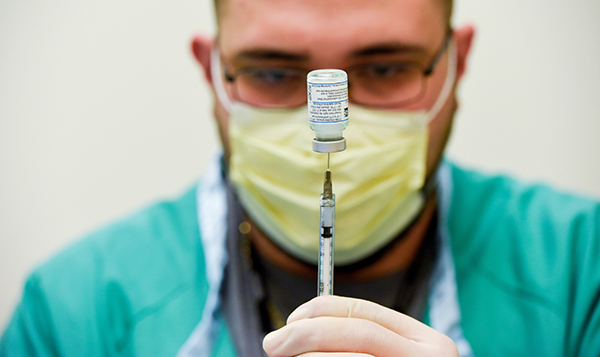
28 Jan UCHealth: Coronavirus Variants & Vigilance!
We curated this excellent article by Ted Neff from UCHealth Today. The title: “Coronavirus variants may be vastly more infectious; vigilance more vital than ever.” Neff adds: “Vaccination ramps up as COVID-19 infections rise in hotspots here and abroad; coronavirus variants could make things much worse.”

A coronavirus variant that has been discovered in Colorado doesn’t appear to cause more severe disease. But the changes the mutation brought to the coronavirus’s spike protein probably make it more contagious. Photo: UCHealth.
Colorado made national news when Gov. Jared Polis announced on Dec. 29 that the state health department had found the first case in the U.S. of a coronavirus variant that had been spreading rapidly in Great Britain and several other countries.
Just over two weeks later, on Jan. 13, the state confirmed its fifth case of the variant known as B.1.1.7. State officials continue to test for it, but they’re doing so with just a tiny sample of the thousands of new COVID-19 cases across the state each day.
The coronavirus variant
Mutations are a part of life. Most lead nowhere; some lead to the likes of cheetahs and sharks. For a virus, the coronavirus happens to be a slow mutator, but that trial and error is happening across trillions of viruses replicating away in millions of bodies, and changes that lead to evolutionary advantage – from the SARS-CoV-2 virus’s perspective, not ours – are bound to happen.
So it was with B.1.1.7. The virus doesn’t appear to cause more severe disease. But the changes the mutation brought to the coronavirus’s spike protein that provides entry into human cells probably make it more contagious. Much more contagious, in fact: 56% more transmissible or more, according to one British modeling study awaiting peer review. Separately, the United Kingdom’s testing and tracing program tracked nearly a million contacts of those who had tested positive for COVID-19. Based on the number of contacts who later became ill, they calculated the B.1.1.7 variant to be 35% to 50% more transmissible. That report was published on Jan. 8.
Dr. Eric Poeschla, a UCHealth physician and head of the Division of Infectious Diseases at the University of Colorado School of Medicine, shared that report during a Jan. 13 virtual Town Hall and did not mince words. U.S. coronavirus case counts are at alarmingly high levels even without new, more easily spread viral variants.
“What’s worrisome is, if this is correct, you throw a 50% or 30% more infectious virus and an exhausted population into the mix, what will happen?” Poeschla said.
Massive competitive advantage
From a virus’s point of view, the more transmissible it is, the more competitive it is…
Continue reading here for more on the mutations, efficacy of vaccines and need to buckle down.


Sorry, the comment form is closed at this time.